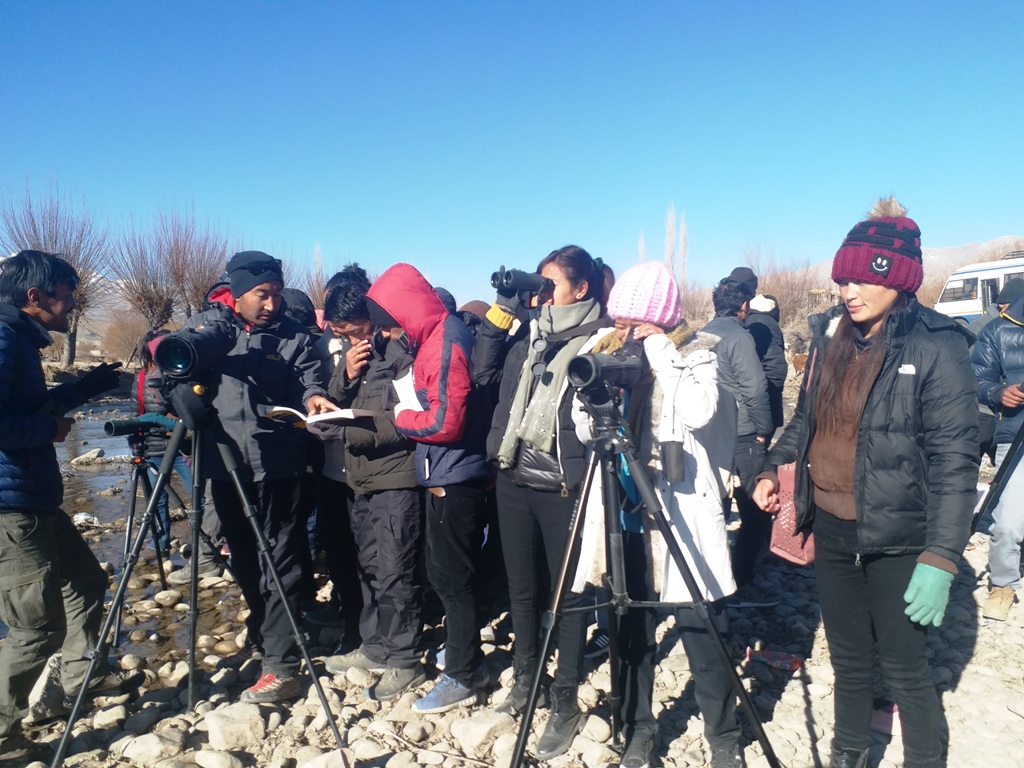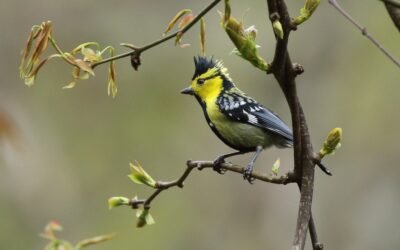(Skip to Campus Bird Count results)
Summary
The global Great Backyard Bird Count takes place every year over four days (Friday – Monday) around the middle of February. Since it is carried out at around the same time every year, GBBC helps create an annual, real-time snapshot of what birds are where. The excitement of this event can be contagious, and this makes it a great platform to introduce people to birds and birdwatching.
GBBC 2019, which took place from 15th – 18th February 2019, was the seventh in India. Over the four days of this event 1,786 birders in India uploaded 22,273 lists, spent a total of 10,764 person-hours birding and recorded 852 species— 65% of the total number of species known to occur in the country. In addition to backyards, birders flocked to all kinds of ecosystems in India, spanning forests, scrublands, high-altitude national parks and coasts.
A big thank you to all our state coordinators, everyone who organised bird walks and talks in campuses and elsewhere in the country, and the reviewers for reviewing submissions at the end of each day.
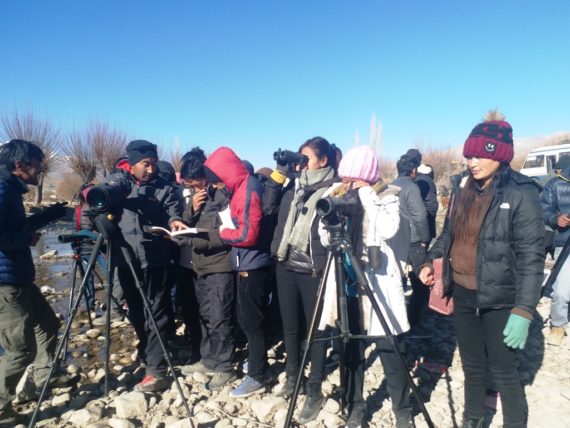
GBBC in Leh. Photo by Lobzang Visuddha
Every GBBC in India bumps up the tallies from the previous years and this year was no different, with higher number of checklists, participants, person-hours clocked, districts covered and species reported, compared to previous years:
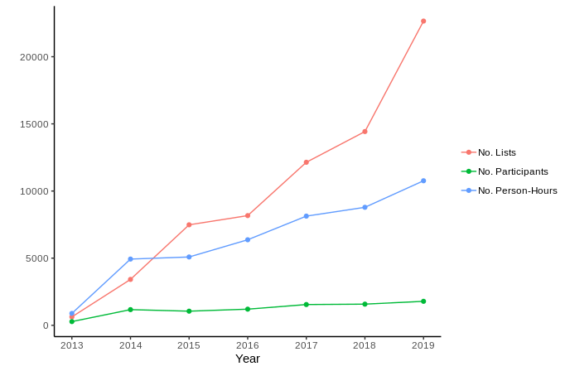
GBBC India participation over the years (2013 – 2019)
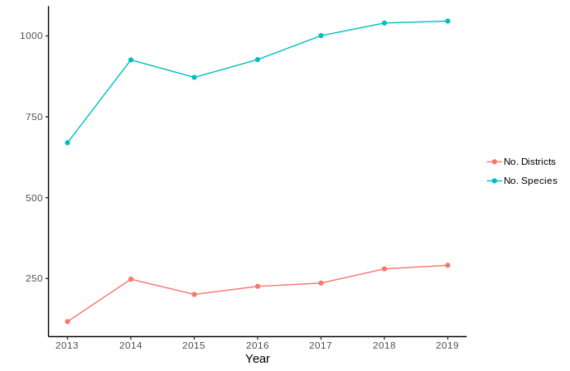
GBBC India over the years (2013 – 2019): number of participating districts and number of species recorded
Interestingly, of the 13.7 million records from India on eBird, 1 million have been uploaded during the various GBBCs (2013 to 2019). In other words, just 28 days over the previous 7 years account for 7% of the information available on eBird in India!
GBBC Global
Compared with 2018, India moved up a notch in the world rankings of both the number of checklists and species reported; in 2019 India stood third in terms of the number of species reported, behind Colombia and Ecuador, and second in terms of the number of checklists uploaded, behind the United States.
Notably, among all the districts in the world (‘counties’ in eBird parlance), Salem, a district in Tamil Nadu had uploaded the most number of checklists– 8420!
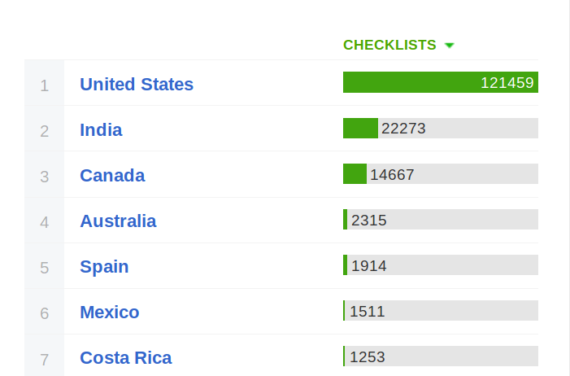
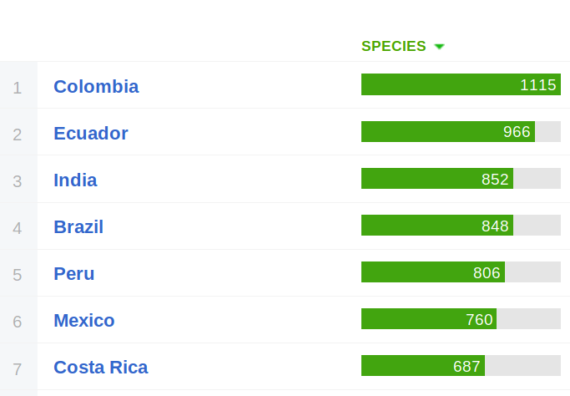
View the full country-wise breakdown by species and checklists on eBird.
GBBC India
Although only 40% of districts in India were covered, there was participation from nearly every state and union territory! In the map below, each list is represented by a translucent red circle, with darker colors indicating multiple lists from the same adjacent locations.
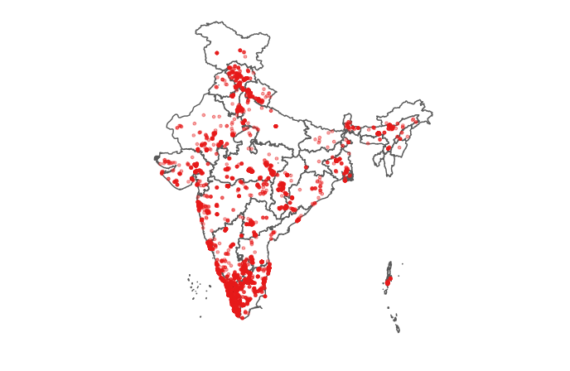
GBBC 2019 coverage map
The top three birded states in terms of checklists were Tamil Nadu, Karnataka and Kerala, with Tamil Nadu uploading a whopping 10,111 checklists.
The state-wise breakups of species, participants, checklists and coverage of districts are shown in the maps below.
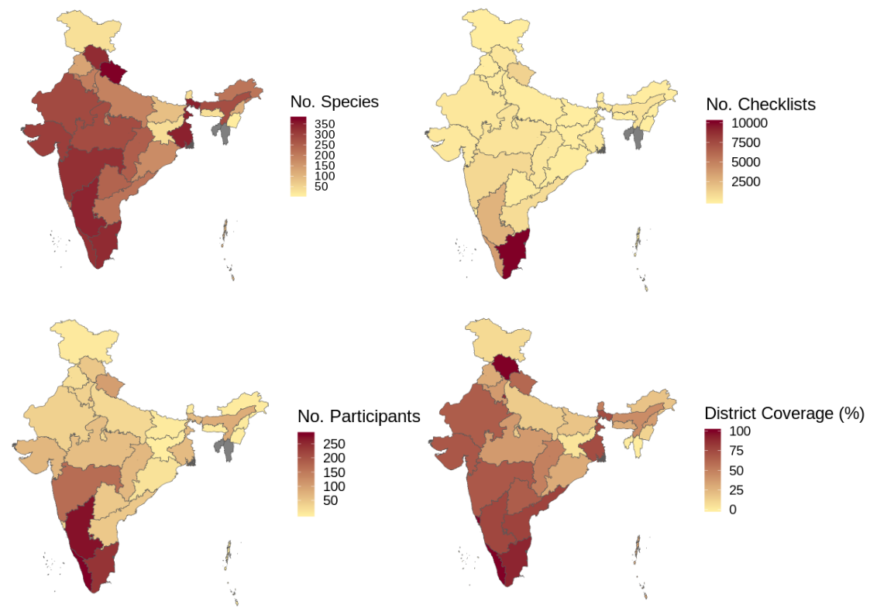
Delhi, Tamil Nadu, Kerala, Himachal Pradesh, Goa and Chandigarh had higher than 80% district coverage, i.e., GBBC participation in more than 80% of districts in the state.
The top ten districts in terms of participants are in the table below:
| District | State | No. Participants |
| Bangalore | Karnataka | 157 |
| Thrissur | Kerala | 81 |
| Dehradun | Uttarakhand | 79 |
| Coimbatore | Tamil Nadu | 68 |
| Kamrup | Assam | 62 |
| Chennai | Tamil Nadu | 45 |
| Pune | Maharashtra | 42 |
| Mysore | Karnataka | 38 |
| Ernakulam | Kerala | 37 |
| Thane | Maharashtra | 33 |
What are the most common species in India?
With this large coverage across the country, it is always interesting to look at the most common species reported during GBBC. In India, the top 5 most common species were House Crow (51% of all lists), Common Myna (42% of all lists), Rose-Ringed Parakeet (36% of all lists), Large-billed Crow (32% of all lists) and Red-vented Bulbul (31% of all lists).
The map below shows the top 5 most common species in terms of their frequency of reporting, in five broad regions in India. Interestingly Purple Sunbird– which did not show up among the “commonest” species reported last year, was amongst the most common species in North-west and Central India; Asian Pied Starling and Spotted Dove displaced House Crow and Feral Pigeon from the top 5 most common species reported in East & North-east India; Black Drongo and Rose-ringed Parakeet displaced Asian Koel and White-cheeked Barbet from the top 5 most common species reported in South India.
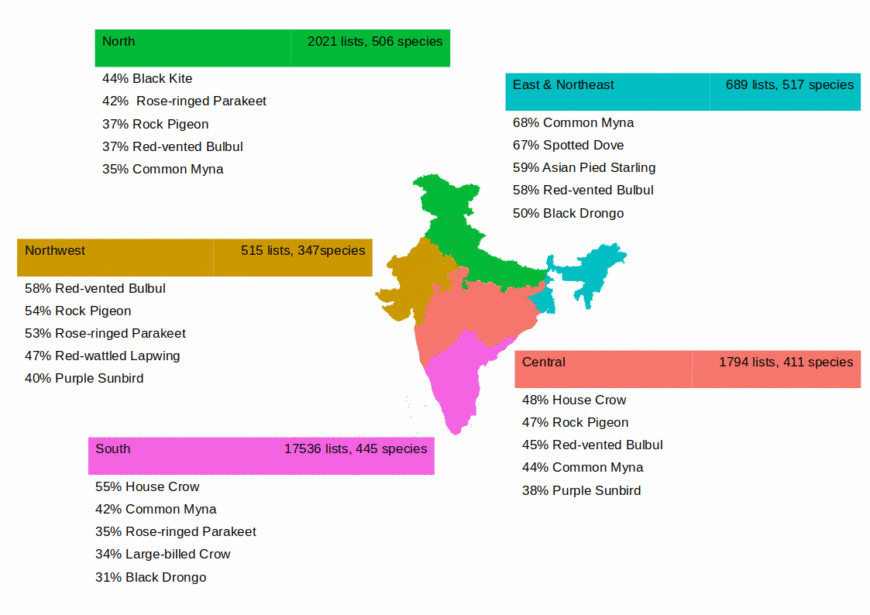
Top 5 species (in terms of frequency of reporting) for the different regions
New sightings in GBBC India 2019
GBBC 2019 recorded 15 species that had not been sighted in the previous GBBCs, including winter migrants like Merlin and Eastern Spot-billed Duck and several rare species like Plain Leaf Warbler and Long-billed Wren Babbler.
| Species | State | Observer |
| Black-headed Shrike-Babbler | Arunachal Pradesh | Lobsang Tsering |
| Blue-fronted Robin | Arunachal Pradesh | CROW Foundation, Anurag Vishwakarma |
| Blyth’s Rosefinch | Himachal Pradesh | Lakshminarasimha Ranganathan |
| Brown-cheeked Rail | West Bengal | Atanu Modak, Biswanath Mondal |
| Chestnut-vented Nuthatch | Nagaland | Navneet Sidhu |
| Chinese Egret | Andaman & Nicobar Islands | Jayadev Menon |
| Eastern Spot-billed Duck | Assam | Rofikul Islam |
| Hume’s Lark | Haryana | Hemant Kirola |
| Kashmir Nutcracker | Himachal Pradesh | Shiv Kumar |
| Long-billed Wren-Babbler | Arunachal Pradesh | Anurag Vishwakarma, CROW Foundation, Lobsang Tsering |
| Merlin | Gujarat | Gnanaskandan Kesavabharathi, Hemant Kirola |
| Plain Leaf Warbler | Rajasthan | John Gregory |
| Rufous-faced Warbler | Arunachal Pradesh | Lobsang Tsering |
| Spot-breasted Scimitar-Babbler | Nagaland | Navneet Sidhu |
| White-browed Tit-Warbler | Jammu & Kashmir | Jigmet Namgyal |
New sightings during GBBC 2019. Click on the species name to view the species on eBird, and the observer names to view the checklist with the species
GBBC’s most dedicated birders
Some birders get a particularly acute case of GBBC fever– the best kind of bird flu– and spend most of their waking hours birding. The world’s top ten GBBC participants, ranked by the number of complete checklists uploaded, were nearly all from India, with 6 individual participants and 3 group accounts (view the full list of the top 100 participants here).
Here are the top dedicated birders in India, who uploaded 100 or more complete checklists of a duration greater than 15 minutes:
| Name | State | Checklists |
| Ganeshwar SV | Tamil Nadu | 245 |
| Divya Subramani | Tamil Nadu | 214 |
| Vadivukkarasi A | Tamil Nadu | 202 |
| Tamil Selvan A | Tamil Nadu | 189 |
| Suguna R | Tamil Nadu | 181 |
| Angeline Mano | Tamil Nadu | 180 |
| Subramania Siva | Tamil Nadu | 180 |
| Vasen Suli | Tamil Nadu | 180 |
| Abhin M Sunil | Kerala | 149 |
| Venkatesh S | Tamil Nadu | 136 |
| Steffin Babu | Karnataka | 133 |
| Afreed Muhammed N V | Kerala | 112 |
| Niranjana C | Kerala | 111 |
| Abhirami C | Kerala | 107 |
Top birders in India, who uploaded a hundred or more complete checklists
(NB: the numbers on the eBird website may differ a little from those presented here because our data totals are as of 16th March)
And the top 5 dedicated birders, in terms of the number of checklists they uploaded, in the different states. A big thank you to everyone!
| Region | State | Names |
| Central | Chhattisgarh | Metalclicks Ajay Ashok, Jageshwer Verma, Softy Smith, Ravi Naidu, Santosh Kumar Verma |
| Jharkhand | Shekhar Sharma | |
| Maharashtra | Ritobroto Chanda, Shubham Yadav, Swanand Patil, Adyasha Nayak, Shashwathi M | |
| Madhya Pradesh | Narendran M.M, Vineith Malabaricus, Ajay Gadikar, Anup Prakash, Pravar Mourya | |
| Orissa | Swetashree Purohit, Dawa Pemba Sherpa, Puspita Jena, Digvijay Pattnaik, Softy Smith | |
| Islands | Andaman and Nicobar Islands | Jayadev Menon, Shubanker Halder, Krishna Anujan, Shakti Vel |
| North | Bihar | Rajesh Kumar, Rahul Kumar (Bipsa), Sabiha Rafyat, Ashok Kumar |
| Chandigarh | Rima Dhillon, Sukhwant S Raj, Virender Sharma, Nitin Gupta | |
| Delhi | Sohail Madan, Chandra Bhushan, Sita Susarla, Lakhan Kohli, Meghna Joshi | |
| Himachal Pradesh | Santosh Kumar Thakur ( Wildlifer) , Lakshminarasimha Ranganathan, Neha Bhardwaj , Kajal Joshi, Rakeshwar Kapoor | |
| Haryana | Kushagra Rajendra, Shinu Goyal, Monika Bhardwaj, Gagan Mittal, Ritika Dhariwal | |
| Jammu and Kashmir | Syed Mustahsen, Sonam Angmo, Lobzang Visuddha | |
| Punjab | Gagan Bedi, Yedu Rajeev, Karan Joshi, Akhil Bhardwaj, Randeep Singh | |
| Uttarakhand | Rajat Rastogi, Ashwin Warudkar, Vivek Sarkar, Shuvendu Das, Jason Coutinho | |
| Uttar Pradesh | Kshitija Gupta, Ramaswamy V, Gomathi Sharadha, Ashish Loya, Paul Holt | |
| East & Northeast | Arunachal Pradesh | Anurag Vishwakarma, Mangkhansuan Samte, Lobsang Tsering |
| Assam | Jaydev Mandal, Upasana Sharma , Subhrajit Rajbangshi , Suman Mehjebin, Vishal Das | |
| Meghalaya | Biang Syiem, Zorba Laloo | |
| Nagaland | Navneet Sidhu, Lansothung Lotha, Angulie Meyase, Onenjungshi Ao | |
| Gujarat | Dhaval Vargiya, Karan Thakkar, Yagnesh Desai, Kedar Champhekar, Gondaliya Gaurang | |
| Rajasthan | Mittal Gala, Gopi Sundar, Swati Kittur, George Watola, Ains Priestman | |
| West Bengal | Debayan Gayen, Sagar Adhurya, Somapika Seal, Sandhya Lenka, Pavel Ghosh | |
| South | Andhra Pradesh | Suyash Sawant, Harikrishnan CP, Senan D’souza, Harsha Kumar, Vajeeha UK |
| Goa | Aditya Naik, Shashikant S. Naik, Omkar Dharwadkar, Mallika Vaznaik, Viola Rodrigues | |
| Karnataka | Steffin Babu, Maxim Rodrigues K, Vinod Shankar, Sheena S, Ashwin Viswanathan | |
| Kerala | Abhin M Sunil, Afreed Muhammed N V, Niranjana C, Abhirami C, Srinila Mahesh K T | |
| Puducherry | Surendhar Boobalan, Vigneshwaran B, Gowtham TR, Chandru M, Ravishankar S | |
| Tamil Nadu | Ganeshwar SV, Divya Subramani, Vadivukkarasi A, Tamil Selvan A, Suguna R | |
| Telangana | Chitra Shanker, Sriram Reddy, Vivek Ramakrishna, Manjula Desai, Ashitosh V |
Top 5 dedicated birders in each state, in terms of number of checklists uploaded
Several group accounts were among the top 10 in terms of the number of checklists uploaded and hours spent birding. Among these were Salem Ornithological Foundation, Salem Krishnampudur School Students and Salem Latchumayur School Students in Tamil Nadu.
Campus Bird Count
The Campus Bird Count runs alongside GBBC in India, to record the birdlife in the multiple campuses across India. Campuses include educational and training institutions, government institutions, research stations, corporate campuses and so on. This year, a total of 173 campuses participated in the Campus Bird Count, across 21 states/union territories, uploading a total of 6,195 checklists, recording a total of 535 species and clocking a total of 2,397 person-hours— an increase from the previous year’s CBC on all counts!
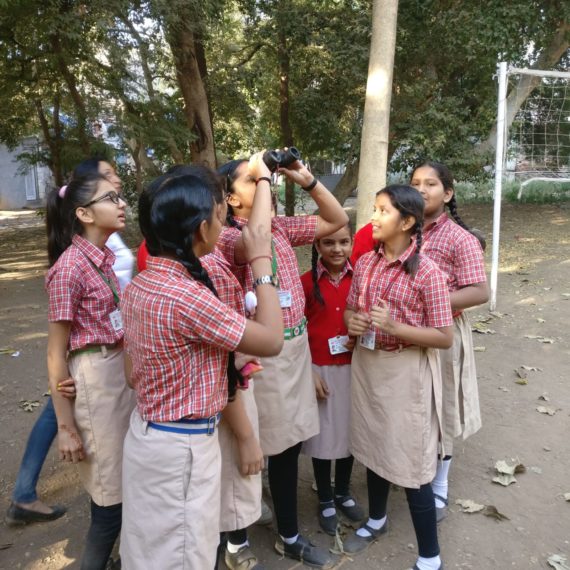
School children birding at Price Ashoka Raje Gaikwad School, Gujarat. Photo by Ketan Shah
In the map below, each translucent circle represents a participating campus, with darker circles indicating many adjacent participating campuses. View all the registered campuses here.
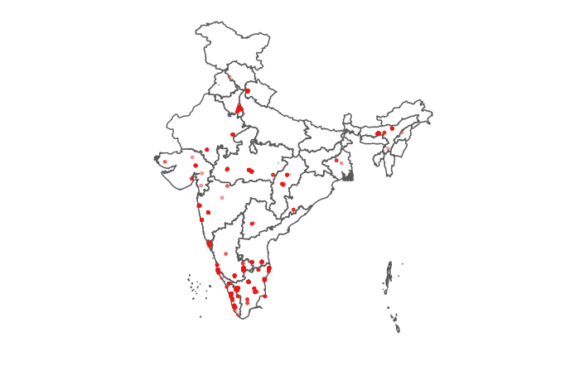
Campus Bird Count 2019 coverage map
Several people put in coordinated efforts to cover the entire area and different habitats of their campuses. The campuses with the top ten highest number of checklists and species are in the tables below:
Campuses with the top 10 highest number of species
Campuses with the top 10 highest number of checklists
(NB: the numbers on the eBird website may differ a little from those presented here because of slight differences in methods of calculation)
GBBC Bird Walks & Talks
There were over 120 bird walks and talks organised across India, with a large number of school and college students and the larger public introduced to birding at educational and research campuses, lakes and other public spaces. The full list of registered events is here.
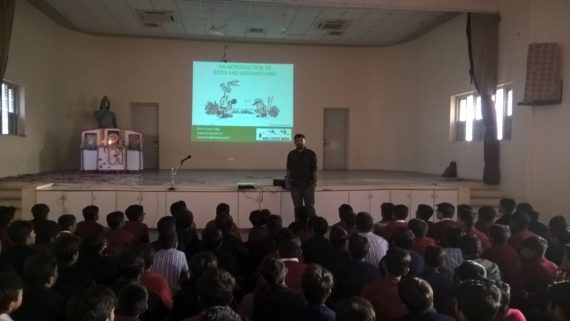
GBBC Talk at Shree K. K. Shah High School, Wankaner. Photo by Ramde Bhatiya
GBBC in the News
There was a lot of news coverage for GBBC this year. Some of the articles are below:
- 332 Species recorded in Himachal Pradesh
- 107 Bird Species Spotted By Avid Birders In Mangalore University
- Chasing chirps: Doon birders meet new visitors in the region
- Campus calling: JNU is top choice for birds
- 38 species of birds sighted from St Aloysius college campus
- First campus bird count event in Nagaland
Further Information
GBBC 2019 was coordinated by Bird Count India and its various partners. For more information, see the following links.
GBBC and Campus Bird Count 2019
- GBBC 2019 in India
- GBBC 2019: Stories from the field
- GBBC 2019 associated events (bird walks and talks)
- List of registered campuses
- GBBC Global
eBird
Bird Monitoring in India
- Visit the Bird Count India website
- Join the Facebook group
Contact Bird Count India at skimmer@birdcount.in
What Next?
60% of districts in India did not have participants in GBBC 2019. By focusing our attention on these districts before the next GBBC, we hope to increase participation and country-wide coverage in GBBC 2020. The table below shows ten states with the lowest district coverage.
| State | District Coverage (%) |
| Mizoram | 0.00 |
| Tripura | 0.00 |
| Jharkhand | 4.17 |
| Jammu & Kashmir | 8.70 |
| Manipur | 11.11 |
| Uttar Pradesh | 15.49 |
| Bihar | 18.42 |
A lot of the value in collating bird observations comes from regular monitoring of the same location over a period of time. This is the focus of “patch birding” as well as more structured surveys, the latter being ideal for a campus. Please keep watching and recording birds, and consider how you could make your observations count more for science and conservation. Do contact us for more ideas.
GBBC will be back on 14-17 February 2020.
Until then, keep birding!
View the next page for the state coordinators for GBBC 2019.

